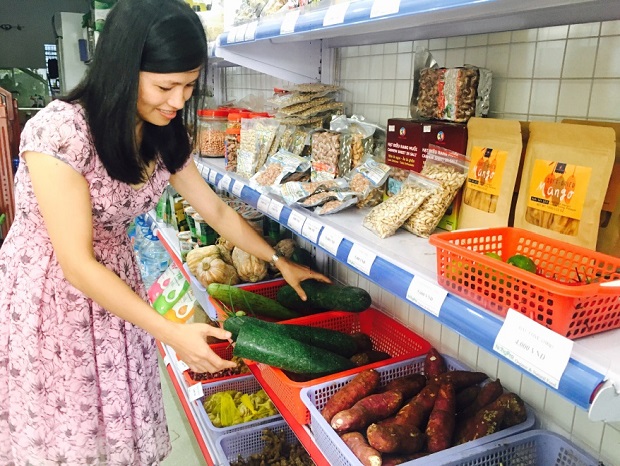Difficulties facing city in developing organic food supplies
Currently, agricultural product suppliers across Da Nang can only provide between 9,000 and 10,000 tons of fruit and vegetables per year, meeting around 7% of the annual demand of local residents.
 |
| A shopper at a local store selling organic and safe agricultural products |
Meanwhile, meat and egg supplies can only meet between 15 and 20% of the local demand. It means that the remainder has to be sourced from other localities across the country in order to satisfy the increasing demand of locals and visitors.
Recently, the city has seen a growing consumer demand for organic agricultural products. To date, only 5 local shops selling organic and safe food products have been granted certificates from the municipal Bureau of Agro-Forestry-Fisheries Quality Assurance. This figure is still very modest in comparison with the demand of local consumers.
However, local relevant agencies find it very hard to encourage local businesses to take part in the local organic vegetable and safe meat supply chain. The main reason is thought to be that certified organic products are generally more expensive than conventional ones. In addition, business premise lease fees in the inner-city are too expensive.
Mrs Nguyen Thi Thuy Dung, Director of the Khoa Hung Thinh Company which is one of the 5 certificated organic product suppliers, said “In addition to expensive premise lease fees, the suppliers of such products have to spend a lot of money on controlling and checking the origins of their products.”
Mr Pham Van Son, External Relation Director of the Tam Nguyen Mien Trung Agriculture Company, remarked that Da Nang has great potential for developing an organic vegetable and safe meat supply chain. The reasons are seem to be that local farmers are very diligent and hard-working, and Hoa Vang District is blessed with rich soil for growing fruit and vegetables.
He, however, noted that the total area of agricultural land in the city is not much. He suggested that the city authorities should facilitate local businesses to rent vacant land lots to grow vegetables, as well as to access preferential loans for developing hi-tech agriculture.
Head of the Bureau of Agro-Forestry-Fisheries Quality Assurance, Mr Nguyen Tu, remarked “The organic food supply chain will be established based on a closer link between farmers and businesses in order to ensure stable and efficient food supply for local residents. However, productivity at organic vegetable growing areas has yet to be ensured due to the city’s small cultivated areas, poor soils, prolonged hot weather and frequent floods”.